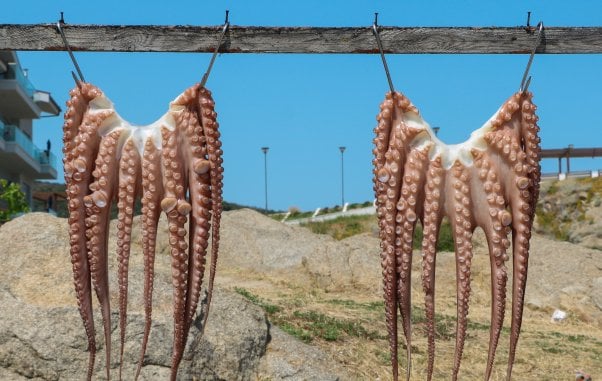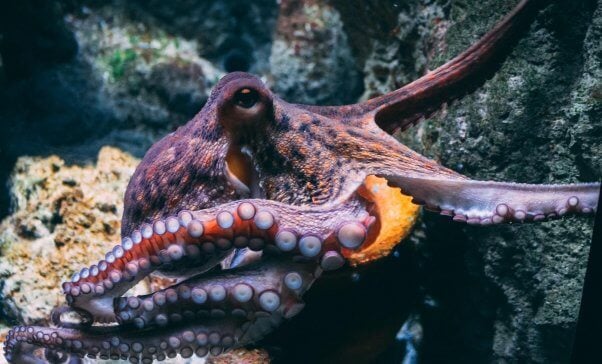Why the World’s First Octopus Farm Must Not Open
Octopuses are known for being highly intelligent animals who play, solve puzzles, and even form emotional attachments, as shown in My Octopus Teacher. Despite this, a company plans to open the world’s first octopus farm in Spain in 2023. Read on to find out what you can do to help PETA stop this atrocity.
Octopuses Just Want to Be Left Alone
Octopuses are asocial by nature, and they’ll suffer acutely if raised for food. They do not have a family structure and will rarely seek out another octopus unless they’re breeding. Most octopus mothers won’t even meet their own babies—they instead hide the eggs, decorate a lair with stones and shells, and guard the nest until they die, as they stop eating in their final months to tend to their eggs.
While Nueva Pescanova, the company behind the octopus farm, has not publicly released a plan for how the octopuses will be kept, it’s assumed that they’ll be forced into cramped living conditions, likely leading to cannibalism and other violence among the animals. Nuevo Pescanova also shared that its octopus survival rates are “estimated to rise to 50%,” meaning that more than half of the octopuses who the company is currently breeding in its preliminary tests die prematurely.
Octopus Farms Would Add to the Climate Catastrophe
Those behind the octopus farm have claimed that raising captive animals will help the ecosystem recover from overfishing, but fish farms (also called aquafarms) discharge waste, pesticides, and other chemicals directly into ecologically fragile coastal waters, destroying local ecosystems. Plus, many fish raised on these farms are predators—like octopuses, salmon, and shrimp—which means that for every pound of farmed fish, several pounds of fish from the ocean are caught and killed for feed. An octopus farm will further strain the ecosystem and increase the number of octopuses suffering globally.
Using Any Animal for Food Is Speciesist
If news of the world’s first commercial octopus farm potentially opening in 2023 makes you uncomfortable, it’s time to re-evaluate why you believe that any animals belong on farms.
All animals require species-specific mental stimulation and protection from exploitation, but their needs are disregarded by farmers and consumers when they’re used for food. Pigs, cows, chickens, and all other animals used by humans already suffer mentally and physically from severe crowding, boredom, and frustration.
Speciesism is the misguided belief that one species is more important than another. This toxic mindset is deeply ingrained in our society, and it results in all kinds of negative consequences—such as believing that it’s OK to tear baby cows away from their mothers so we can eat cheese made from their milk or to breed sensitive, playful, self-aware pigs just so we can eat their flesh. If your conscience is telling you that it’s wrong to imprison highly intelligent, problem-solving octopuses, you should apply that same line of thinking to every animal exploited by humans and learn more about going vegan.
‘So Long, Suckers’: Help Stop the World’s First Octopus Farm
Exploiting fascinating octopuses—or any other animals—for human consumption is cruel. There is no such thing as “humane” meat. So if the plans for the octopus farm upset you, consider how speciesism affects whom you are willing to harm and eat. Whether they’re kept on a farm or kidnapped from their ocean homes, never eat sea animals. Take action for octopuses today!




